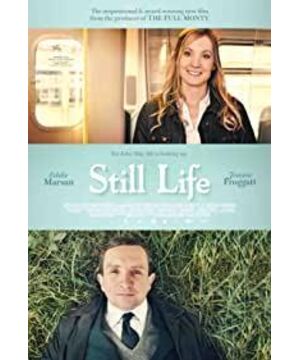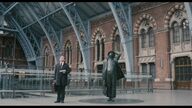I saw a movie last night called "A Silent Life", or it has a more straightforward translation, "Farewell without Attendance". With minimal cinematic language and restrained emotional expression, Uberto Pasolini speaks of the loneliness and death of modern man. It fits right in with the current pandemic, the death and its prelude—disease, the loneliness of isolation, and those distant lives lost.
Originally I wanted to title it "It's Probable No One Will Attend My Funeral", but in order to find a sense of community even in this miserable situation, I changed it to "we", which is indeed possible for everyone Facing an increasingly clear social phenomenon. The most ceremonial funeral in the long human society is faced with the death of the deceased becoming the "delisted" of the secular society, and no longer a bridge between human beings and the mysterious world. Behind this is the change in the outlook on life after the secularization of the entire human society, which this film attempts to describe and oppose. While this is a film that seems slow and peaceful no matter what, its final scene is a powerful statement that death shouldn't be seen as "some sort of end" and taken lightly. Death that occurs to any member of society concerns everyone who is still alive, as well as the human social community. If this age-old belief ceases to exist, it will lead each of us to slip into the abyss of unbearable loneliness.
Let's take a look at what the movie is about.
Mr. May rummaged through boxes in a cramped empty house. An old woman living alone dies, and he tries to find clues from her personal belongings. His rubber-gloved hands flipped through her albums—smiles of different ages, accompanied by different people. His gloved hand ran over her neatly arranged records, the red beads in the jewelry box, the printed cotton dress in the closet.
Mr. Mei's assistant turned out a letter, "Mom," the assistant read. "She has children?!" Both the assistant and Mr. Mei seemed to have found a major clue. They read on, in an awkward tone, the letter signed "Love your Casey" and a cat paw, Casey being her cat.
This is Mr. May's daily life. He is a civil servant in the community. He arranges the death of people who live alone and die. Find them, pick up the bodies (as they are often found after several days of death), search for clues, write eulogies, arrange funerals, bury them.
He arranges churches of different faiths for those with religious beliefs, Orthodox, Islam, Christianity, Catholicism. He is the only audience under the priest's eulogy. He will lie down secretly when choosing a cemetery for the deceased and feel the light of the buried. Sunshine and possible views; he arranges cremations for atheists and finds a suitable tree for each box of ashes.
So the old woman who lived alone in Mr. May's eulogy, had a beautiful smile, loved beauty, her red beaded and floral dress complemented each other, was loving, and lived a loving and communicative life with her cat, Casey, because they communication from time to time.
Mr May also chose the one with the most wear and tear from the Solitary Woman's record for her funeral, because that was probably her favourite.
In life, Mr. Mei lives alone, is reticent and meticulous, eats the same food, wears the same clothes, and follows the same "modern life" rhythm. It's just that he has a big album, carefully collecting the photos of every deceased person he handles, with all kinds of lively smiles, and that night, he carefully added the photos of women living alone.
Soon, Mr. May's rhythm of life was disrupted. The new boss has a Trump-esque grin. He called Mr. Mei over and commented on his low work efficiency and high burial rate, and decided to fire him and give him the last three days. Mr. Mei could only murmur in a low voice: "The burial is because of religious beliefs..." The boss disagreed: "The funeral is for the living. If no one attends, it means that no one cares, and the dead don't care anymore", and suggested that he Find a "job with living people" "Activate!"
Mr May is determined to use the last minute to complete his last case - a homeless homeless man who has been dead for a long time, and he is determined to try to piece together the trajectory of the life of homeless Billy Stoker.
Based on the items collected from Billy's room and the film that was thrown into the dump, Mr. May found out who had an intersection with Billy in the past. So this normal should be sealed and concluded that Billy, who had been in prison, had a violent personality, was abandoned by his family, a homeless alcoholic, and died alone and tragically, through Mr. The factory colleagues, former lovers, homeless people on the streets together, and his daughter Kelly, from the few recollections of these people about him, Billy is no longer an unknown dead person, but to fight for five more minutes for his colleagues The right to rest, the person who was fired by the boss, the person who saved his comrades from death, the person who used his teeth to bite the belt and hung three and a half points in prison to raise money for the charity, the person who put the arm of the gangster who dared to harass the lover into the frying pan , a bad-tempered father who loves his daughter... Billy is unruly, but he is just as meticulous as Mr. May, lonely.
Thanks to Mr. May's efforts, more people agreed to attend Billy's funeral. And he also seems to have a good relationship with Billy's daughter Kelly. Life saw a happy turning point. The happy Mr. Mei did not look around as cautiously as usual when crossing the road. With the sound of brakes, Mr. Mei's life came to an abrupt end, and he blinked towards the sky.
The film ends with the relatively lively funeral of Billy with the unknown Mr. May's death. He was buried and the workers left. But suddenly a large group of people flocked to his grave, it was the undead, every undead he had taken seriously.
In Coetzee's novel "Waiting for the Barbarians," he describes a persistent and potentially threatening sense. This kind of crisis like "the arrival of the barbarians" is actually the spiritual predicament of human morality and civilization, the helplessness and anxiety brought about by the powerlessness of the nation and society to which one belongs, and the resulting spiritual crisis. Modern people's existence, pain and feelings of others have gradually become indifferent due to improper education and habits.
There are undoubtedly many explanations for the emergence of this phenomenon. I personally think it has a lot to do with the development of science and technology and the reshaping of the human outlook on life. It sounds contradictory at first. With the development of science and technology, shouldn't we be more civilized? Why is there a "barbarian" crisis instead?
Perhaps we should talk about the "view of life" which is more important than the "three views". Today's human beings are more "scientific and rational" than at any time in history, in fact, they believe in the "one world view" view of life.
Past and present life, reincarnation of the six realms, going to heaven and going to hell are already fragmented residues in various civilization systems, right? Who would believe in their hearts? Buddhism is a "three world view", there are past lives and future lives, Christianity is a "two world view", there is another world after death, and this life is only a short-lived existence.
Even in more primitive civilizations where religion is not the mainstay, the world after death is the most important issue for those living. Governs the actions and thoughts of all living beings. Never in history has there been such a firm belief in the "one-world view" of life that "people die like a lamp goes out".
"Living to death" is the most important way for the ancestors of various human races to place their "spirits".
A long-standing custom of "voluntary death" among the Chukchi ethnic groups in northeastern Siberia. The Chukchi people believed that after voluntary death, they would enter a paradise filled with the northern lights and play a ball (a ball made from a walrus skull) without worry.
The Sami people in the far north of Europe believe that the Northern Lights are a battle of heroes in the sky, a place of glory and happiness. Accepting voluntary death is not only a devotion to ancestors and family, but that their souls can be reborn in family descendants.
According to Qisander, when the Chukchi people reach a certain age, they will begin to prepare for voluntary death rituals, with the participation of the whole clan. Given their firm concept of reincarnation and resurrection, their attitude towards death is very calm. They believe that the soul can be divided into two parts, in which the bright and good part can ascend to the upper world and play in the aurora world, the dark and vile part fall into the lower world for redemption, and the two parts can reunite and enter the middle world again. The Chukchi people understand the other world from the perspective of experiential reversal, which is not different from the world of real life, but everything is reversed, with day on one side and night on the other. So when an old man leaves the real world or another world, the soul returns through the newborn baby.
The average length of a Dayak funeral is 2 years. They believe that only after a long period of time can the corpse slowly decompose and decay, the bones can become dry, and the soul will slowly leave. For the Dayak, "death is not a single event that occurs only once in one's life , it's a recurring event. Death is simply a transition from one form to another." Life and death are inseparable. Death follows life, and life rises from death. Death is the seed that brings life. Death is more than destruction, it is a transition. As the old body dissipated, a new body began to form. Transformation is the law of all things.
The Dayaks conceived of the interrelationship between the living and the dead. The two depend on each other, with the living being protected and blessed by the dead, and the dead enjoying regular sacrifice, respect and remembrance. Mutual care is an essential element in the right relationship between the living and the dead.
So, what are the most direct consequences of the "one world view" view of life and death that "people die like a lamp goes out"?
Will it be one that believes in instant pleasures, and on the other, is full of "calculation"? And because of what he did in this life, he would not be bound by the post-mortem judgment, and he would not think too much about the "compliance" of his actions in the eyes of higher-level deciders, as long as there was no discovery by human counterparts in this world.
Another result is likely to be that there is no way to treat all human beings and all lives equally. People who believe in the "view of one world" can only decide their attitude towards this person based on where he meets other people in this world, and there is an absolute utilitarianism. For example, a monk who believes in the "Three Worlds View" may treat an ant or a pangolin kindly, because he knows that this little animal may have been a general in the past life, and even become his relative in the next life. Then if you know that someone you don't care about now may decide your fate in the next life, would you still be so careless about him?
Another level is that if a scientific and rational belief in the "one world view", there will be a deep anxiety and fear about death and the approach of death, and the advancement of life. An insurmountable restlessness.
So in order to solve the "nowhere to put the heart" that all this brings, we need to re-examine death. Although modern life has turned each of us into an island, there should be some kind of bond that re-binds us in Together. Death should not be obscured and forgotten, but should become a common belief in the world of the living through ritual and mourning.
In this epidemic, so many of our members have unfortunately died, and a grand ceremony should be held for them, with the participation of all members. Their sacrifice in a sense has brought the luck of the living to continue their lives.
At the end of the film, the director also let us see that the beauty and kindness of Mr. Mei's ordinary life, the dead souls all remember
View more about Still Life reviews











